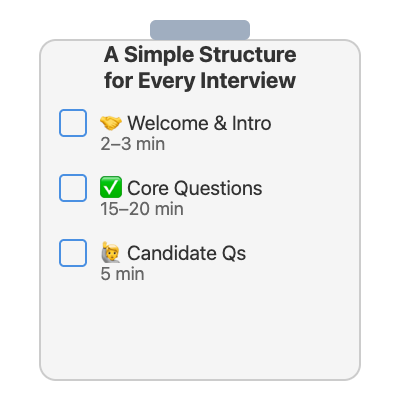Welcome to Preparing for the Interview!
As an interviewer, your preparation sets the stage for a fair, insightful, and effective hiring process. When you plan ahead, you create a consistent experience for every candidate, ask questions that reveal real skills, and gather the evidence you need to make confident decisions. This not only helps you identify the best fit for your team, but also reduces bias, builds trust in your process, and ensures every candidate gets a fair shot. Thoughtful preparation is the foundation for building strong, high-performing teams and a positive reputation for your organization.
In this unit, you’ll learn how to:
- Prepare for each interview so you can take effective notes and ensure every candidate is evaluated consistently and fairly.
- Create a welcoming environment to help candidates feel comfortable, which leads to a more authentic and positive interview experience.
- Ask targeted, behavior-based questions to gather detailed and meaningful responses that reveal real skills and experience.
- Lead the interview with confidence and manage time well, so you cover all key topics and give every candidate a fair opportunity to shine.
By the end of this lesson, you’ll be ready to plan and conduct interviews that are structured, objective, and set every candidate up for success.
A well-structured interview is the foundation of a fair process. Consistency matters: when every candidate gets the same core questions, you can compare responses directly and reduce bias.
Here’s a simple way to structure your interview:
- Welcome and Introductions (2-3 min)
Set the tone, explain the interview format, and help the candidate feel comfortable. - Core Questions (15-20 min)
Use the same set of behavior-based questions for every candidate applying to the same role. - Candidate Questions (5 min)
Give candidates a chance to ask you about the team, role, or company.

Instead of open-ended prompts like “Tell me anything about yourself,” use targeted questions such as:
"Can you describe a time you had to quickly learn a new technology to complete a project?"
This approach keeps things focused and ensures you’re gathering relevant, comparable information.
Behavior-based questions are most effective when they’re tailored to the specific skills and challenges of the role you’re hiring for. Instead of generic prompts, craft questions that reflect real situations the candidate might face in the job. This helps you gather concrete evidence of their abilities and experience.
For example, here’s how you might design behavior-based questions for different roles:
By aligning your questions with the real demands of the role, you encourage candidates to share relevant stories from their past work. This also gives you clear, job-related evidence of their skills and problem-solving abilities.
It’s also important to have your questions prepared in your notes and to take notes during the interview. When you’re preparing to take notes, focus on capturing the essentials. Instead of writing everything down, jot a quick summary of the candidate’s response and any standout quotes that show their thinking or impact (for instance: “I coordinated with design to prioritize accessibility, even under a tight deadline.”).
This method keeps your evaluation focused on what the candidate actually did, not just your impressions. It makes your decisions more objective and reliable.
Tips for Effective Interview Preparation
- Review the job description and make sure your questions align with the most important skills and behaviors for the role.
- Set up your interview environment so it’s quiet and free from distractions.
- Have your questions and note template ready to go before the interview starts.
Here’s how a real conversation about interview prep might sound:
- Ryan: Natalie, should I just make up questions as I go in the interview?
- It’s better to plan your questions ahead of time so every candidate gets a fair chance.
